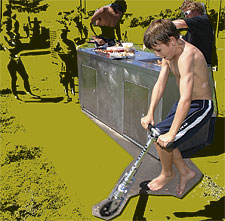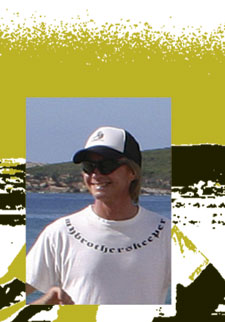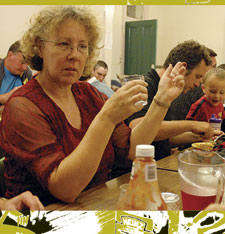Outside the suburban Bible belt it is clear that fewer people than ever are willing to enter our churches.
The answer? We must take church to the people. But how can this be done?
Total Church - the story of The Crowded House, a growing network of church plants in working-class England - suggests what is a deceptively simple solution: we must be intentional about both mission and Christian community.
As Michael Jensen explains in his critique of Total Church, authors Steve Timmis and Tim Chester, "assert that Christian life and mission should be framed according to two principles: the gospel on the one hand, and community on the other';
"These two foci are overlapping, interlocking and mutually informing of one another in every way. The gospel is a true word, and objectively true, but its truth is realised by the life of the church as it lives out the love of God for the world in practice. "
Why the hype?
 Some within Sydney Diocese have admitted to me they feel a bit confused about the hype around Total Church - what really is so different or new about this model that can justify the buzz?
Some within Sydney Diocese have admitted to me they feel a bit confused about the hype around Total Church - what really is so different or new about this model that can justify the buzz?
On one level this reaction is understandable " talk about the importance of "community' in ministry has been around since the 1970s when people read with fresh eyes about the New Testament church in Acts.
These biblical insights were particularly foundational in the house church and cell church movements. Indeed the emerging church, which has informed Timmis and Chester [*UPDATE], draws on the insights of these earlier movements.
But in some key ways we are witnessing an entirely different "mindset' to these earlier movements. This new generation of churches is shaped more by the urgency of "mission' rather than a reaction against perceived deficiencies in the traditional models (whether liturgical or attractional/seeker). Tinkering with the Sunday church event to make it more "relevant' " and all this means about focusing on ministry technique - is no longer part of the agenda. In this sense these ‘mission-shaped’ churches are a clean break with the past.
Nevertheless, because we are talking about a different "mindset' rather than a tangible model, it is sometimes difficult to grasp what is different here.
In concrete terms we are seeing a trend towards downplaying church as a "Sunday event'. In some cases, "missional' churches are so far "outside the church walls' that people can be part of the Christian fellowship without ever meeting together on a Sunday or entering a building (of any kind).
As Michael Jensen explains, this mindset sees "church' as "less about a Sunday meeting and more about sharing a common life " which will of course be expressed in the way we meet'.
"This means less emphasis on programs and courses, and on producing a glamorous and exciting Sunday event, and more emphasis on developing and deepening people's relationships with one another."
From my much longer piece in April SC, here are two sketches which I hope illustrate two key distinctions of the ministries that fall within the same "missional' family as The Crowded House. In my mind it is the outworkings of these two key distinctives that make these churches utterly different to what I have observed in the vast majority of parish ministries in Sydney.
1. ‘Church’ becomes a "salt and light' community
 Only a year ago, BJ Koppl says he was one of those people "outside the church walls" who "judge churchies". He thought Christians "had a false sense of reality" because they were "scared" of people like him and would never accept him.
Only a year ago, BJ Koppl says he was one of those people "outside the church walls" who "judge churchies". He thought Christians "had a false sense of reality" because they were "scared" of people like him and would never accept him.
However BJ says he got to a point in his life where he "couldn't continue" without finding something more. Through a friend who is a professional surfer, he made contact with the Rev Steve Bligh and the other leaders from Maroubra Surfers Church via their MySpace website.
"I never knew of anything like this before I requested a friendship through Myspace… The truth is that they really care about us."
In a radically different model to any other church I have encountered, Maroubra Surfers Church does not rent, own or even use any one sheltered meeting place. They meet in the street, on the beach, under public summer sheds, in homes and at a local café as necessity and weather dictate. They also meet at various times, although a family-friendly "Grom Church' " which includes surf skills training and a BBQ " is held on Sunday mornings at Maroubra Beach.
"We generally want to meet where our community gathers and where we can easily access each other," explains Steve Bligh.
 For 30 years, Steve has been working "on and off" with Maroubra surfers. However like Total Church's Steve Timmis and Tim Chester at The Crowded House in northern England, as Steve applied what the Bible says about church in a mission context, the significant witness of the church as a community became clearer.
For 30 years, Steve has been working "on and off" with Maroubra surfers. However like Total Church's Steve Timmis and Tim Chester at The Crowded House in northern England, as Steve applied what the Bible says about church in a mission context, the significant witness of the church as a community became clearer.
"Fundamentally, Surfers Church is shaped by my understanding of the New Testament church and the way I see Jesus interacting with the disciples," he says.
The ministry also reflects Steve's intuitive understanding of the tough, macho world that is the Maroubra surfing scene " portrayed in the recent Russell Crowe-backed documentary Bra Boys.
"The surfing community itself, generally speaking, has a strong sense of brotherhood and local identification. It's not that hard to build on the community that is there anyway."
Steve says it is not unusual for Surfers Church "to make contact with a young bloke" like BJ who is wrestling with an issue. They aim to make up a small group to disciple and support the newcomer. Surfers Church currently has half a dozen such small groups.
"We use MySpace, Facebook and our website a lot. This has proved very helpful at raising awareness, communications and initiating relationships in the local and worldwide surfing community."
BJ has now been part of the Surfers Church community for just under a year.
"I was saved by Jesus at Surfers Church and have since been living God's mission for my life," he says.
The notion of "Christian brotherhood' runs deep at Surfers Church. BJ explains that while the members of Surfers Church "live and breathe the Maroubra surfing community", an important part of their witness is being "set apart" as a Christian community.
"We live with these people, we talk every day in the surf or at the pub… We show that there is a different way to live - one out of the Bible. I never knew that there was [this different way], but now I do…. We don't like the fighting and the drugs and the drinking that happens… but we have a genuine love and respect for one another."
2. Mission priorities will transform even mature Christians' cultural preferences
 After 30 years as a Christian, including tours as a missionary in Africa and Asia, Judy Murray says she has never been so challenged by Jesus than early last year when she was asked to enter community with guys recovering from drug addiction.
After 30 years as a Christian, including tours as a missionary in Africa and Asia, Judy Murray says she has never been so challenged by Jesus than early last year when she was asked to enter community with guys recovering from drug addiction.
"It was right outside my comfort zone," explains Judy. "It did raise questions in my mind about personal safety."
Judy and husband Lionel had lived in Lawson in the Blue Mountains for 10 years where they were involved in the local Anglican church.
Believing the traditional approach to church was struggling to reach many within the local population, they prayed for mission opportunities to arise. In early 2006 they heard that Church Army was seeking to establish a local mission base in the historic Kihilla Conference Centre.
In essence, the Lawson Local Mission Base is very similar to the Total Church concept. And here, as in Sheffield, we see the way that being part of Christian community transforms people's personal preferences (sometimes completely understandable), which are often roadblocks to reaching out beyond a middle-class context.
Judy and Lionel joined two other couples in forming the core of the Lawson mission team. And right from the beginning Judy said she was challenged by the other core members to think about her personal preferences: one key issue was church music.
In the first year, the team also struggled to find a point of connection with the many "unreached" in the Mountains: they had stalls at the Sunday magpie markets, they met locals at the pub and did backyard blitz days for residents.
It then became clear that God was bringing people struggling with addiction to their door.
This proved a massive challenge to mission team members including Judy who perceived they would be opening their lives up to strange men with tough pasts.
"We have a seven-year-old daughter who is our delight. When we heard about the restoration ministry, as a parent, I was very concerned," she admits.
Then Judy met Craig, one of the first men to enter the residential program. Craig is a quiet and gentle man, but his addiction had estranged him from his family, and he was heartbroken at being cut off from his young son.
Judy says it has been both challenging and exciting to walk alongside men who know so little about the Christian faith but are so hungry to learn more.
"The deeply satisfying times are when over dinner we have a discussion that changes their previously held beliefs."
Craig has now been clean for seven months, has committed his life to the Lord, and was recently reconciled with his son.
[UPDATE: Steve Timmis says The Crowded House has not been influenced by the emerging church]























